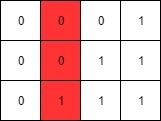(This problem is an interactive problem.)
A row-sorted binary matrix means that all elements are 0 or 1 and each row of the matrix is sorted in non-decreasing order.
Given a row-sorted binary matrix binaryMatrix, return the index (0-indexed) of the leftmost column with a 1 in it. If such an index does not exist, return -1.
You can't access the Binary Matrix directly. You may only access the matrix using a BinaryMatrix interface:
BinaryMatrix.get(row, col)returns the element of the matrix at index(row, col)(0-indexed).BinaryMatrix.dimensions()returns the dimensions of the matrix as a list of 2 elements[rows, cols], which means the matrix isrows x cols.
Submissions making more than 1000 calls to BinaryMatrix.get will be judged Wrong Answer. Also, any solutions that attempt to circumvent the judge will result in disqualification.
For custom testing purposes, the input will be the entire binary matrix mat. You will not have access to the binary matrix directly.
Example 1:
Input: mat = [[0,0],[1,1]] Output: 0
Example 2:
Input: mat = [[0,0],[0,1]] Output: 1
Example 3:
Input: mat = [[0,0],[0,0]] Output: -1
Example 4:
Input: mat = [[0,0,0,1],[0,0,1,1],[0,1,1,1]] Output: 1
Constraints:
rows == mat.lengthcols == mat[i].length1 <= rows, cols <= 100mat[i][j]is either0or1.mat[i]is sorted in non-decreasing order.
Binary search.
# """
# This is BinaryMatrix's API interface.
# You should not implement it, or speculate about its implementation
# """
#class BinaryMatrix(object):
# def get(self, row: int, col: int) -> int:
# def dimensions(self) -> list[]:
class Solution:
def leftMostColumnWithOne(self, binaryMatrix: 'BinaryMatrix') -> int:
rows, cols = binaryMatrix.dimensions()
res = -1
for row in range(rows):
left, right = 0, cols - 1
while left < right:
mid = (left + right) >> 1
if binaryMatrix.get(row, mid) == 1:
right = mid
else:
left = mid + 1
if binaryMatrix.get(row, left) == 1:
if res == -1:
res = left
else:
res = min(res, left)
return res/**
* // This is the BinaryMatrix's API interface.
* // You should not implement it, or speculate about its implementation
* interface BinaryMatrix {
* public int get(int row, int col) {}
* public List<Integer> dimensions {}
* };
*/
class Solution {
public int leftMostColumnWithOne(BinaryMatrix binaryMatrix) {
List<Integer> scale = binaryMatrix.dimensions();
int rows = scale.get(0), cols = scale.get(1);
int res = -1;
for (int row = 0; row < rows; ++row) {
int left = 0, right = cols - 1;
while (left < right) {
int mid = (left + right) >> 1;
if (binaryMatrix.get(row, mid) == 1) {
right = mid;
} else {
left = mid + 1;
}
}
if (binaryMatrix.get(row, left) == 1) {
if (res == -1) {
res = left;
} else {
res = Math.min(res, left);
}
}
}
return res;
}
}/**
* // This is the BinaryMatrix's API interface.
* // You should not implement it, or speculate about its implementation
* class BinaryMatrix {
* public:
* int get(int row, int col);
* vector<int> dimensions();
* };
*/
class Solution {
public:
int leftMostColumnWithOne(BinaryMatrix &binaryMatrix) {
vector<int> scale = binaryMatrix.dimensions();
int rows = scale[0], cols = scale[1];
int res = -1;
for (int row = 0; row < rows; ++row) {
int left = 0, right = cols - 1;
while (left < right) {
int mid = left + right >> 1;
if (binaryMatrix.get(row, mid) == 1) {
right = mid;
} else {
left = mid + 1;
}
}
if (binaryMatrix.get(row, left) == 1) {
if (res == -1) {
res = left;
} else {
res = min(res, left);
}
}
}
return res;
}
};/**
* // This is the BinaryMatrix's API interface.
* // You should not implement it, or speculate about its implementation
* type BinaryMatrix struct {
* Get func(int, int) int
* Dimensions func() []int
* }
*/
func leftMostColumnWithOne(binaryMatrix BinaryMatrix) int {
scale := binaryMatrix.Dimensions()
rows, cols := scale[0], scale[1]
res := -1
for row := 0; row < rows; row++ {
left, right := 0, cols-1
for left < right {
mid := (left + right) >> 1
if binaryMatrix.Get(row, mid) == 1 {
right = mid
} else {
left = mid + 1
}
}
if binaryMatrix.Get(row, left) == 1 {
if res == -1 {
res = left
} else {
res = min(res, left)
}
}
}
return res
}
func min(a, b int) int {
if a < b {
return a
}
return b
}



